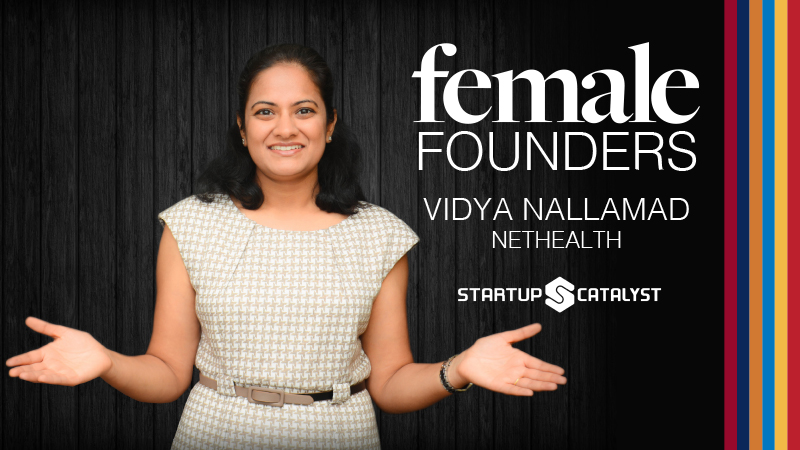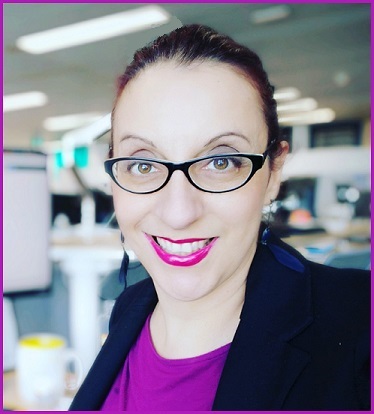Welcome to ‘Female Founders’, the Information Age series profiling 12 women who have grabbed the entrepreneurial reins and ridden into the unpredictability of start-up life.
We talk to the women about their business, entrepreneurship journey and advice they’d give to other women considering starting their own business.
Information Age interviewed all 12 women on the Start-up Catalyst Mission to London this year. Start-up Catalyst runs regular missions for start-ups, investors, and other leaders to some of the world’s top tech hotspots, such as Silicon Valley, Israel, Hong Kong and London. The goal? To transform both the individual and innovation landscape in Australia.
Today we speak with Vidya Nallamad, co-founder of NetHealth.

Name: Vidya Nallamad, co-founder
Business: NetHealth
Established: 2013 in Brisbane
No. of employees: 4
No. of customers: 250
Information Age: Tell me about your business.
Vidya Nallamad: NetHealthData is a software platform from NetHealth. We are into managing people's chronic conditions with the help of their chosen healthcare professionals and remote health monitoring. Our primary aim is to avoid people being hospitalised and take back the control of their health.
IA: What problem does your business solve?
Vidya: In Australia there are more than 200,000 people who are admitted to hospital every year, primarily due to diabetes, a heart problem or obesity. These are potentially preventable hospitalisations. This is costing the Australian Government a huge amount and we want to avoid those hospitalisations through remote health monitoring and avoid health complications.
IA: How did the idea for your business come about?
Vidya: It’s a personal story concerning my father. He is a diabetic and lives in India. He lost vision in his left eye in 2016. We didn't know the reason so he started using my platform, which was in its very early stages. His GP was able to monitor his blood sugar levels and saw the medication he had prescribed wasn’t working. He changed his medication and fortunately my father got his eyesight back. That was my personal experience and that's where I saw there was potential for children like me – who are worried about their parents – to have them monitored and avoid complications with their health management. So, I basically began the platform to help my father.
IA: What is the vision for your business?
Vidya: To make a difference in people's health. That's my aim. Our roadmap, our vision is to help people have a good quality of life.
IA: Who is your ideal customer?
Vidya: There are two sectors that could really benefit from NetHealthData, which is where we are placing our primary focus.
One is gestational diabetes for females who are in their 19th, 20th week of pregnancy. These women need to have their blood sugar monitored, as it can affect the health of her baby. It is a crucial time in the pregnancy time and our platform can monitor blood sugar levels easily.
The other is people who work in corporates. They are at high risk of developing chronic conditions because of the stress involved in their jobs.
These are the two areas we are focusing on.
IA: What has been your biggest challenge to date?
Vidya: One of my mentors, he said, "Vidya, you have two issues that really makes it hard for you to progress. One, you're a female founder. Two, you're in the most conservative thinking field, which is health tech."
That was the main challenge I encountered – trying to educate people in health tech about what we can do, such as the doctors and surgeons who are so conservative in their thinking.
I spent the first three years of starting the company educating people before I introduced NetHealthData to them.
IA: What jobs have you had in the past?
Vidya: I've had a few jobs including software engineer tester, and working with a betting company taking bets in the contact centre.
The main job that helped me with this start-up was my job at GE and Philips Medical Systems as a hardware specialist.
IA: What do you think will be the first international market you enter?
Africa. Primarily, people think of the US or the first world countries as being good markets, but what we have seen is that in second world, third world countries like Africa, there is a huge appetite for digital health. They have the infrastructure, and they want people from first world countries to recognise there is a problem in that country.
For me, rather than getting lost in the US, I could be the kingmaker in a country like Africa and make a difference in that society. There are so many people with diabetes and heart problems – and they’re being neglected.
IA: Where do you think your business will be in five years?
Vidya: In at least 10 to 12 countries. In five years, I would say, I'd like to have a good number of people telling me that I've saved their toe from being amputated, or helped them avoid being hospitalised.
IA: How have you funded your business?
Vidya: To date, it has been self-funded.
Initially, it was my house savings that went into the business, but now we are generating revenue that's keeping us afloat.
IA: Do you have any plans to raise money?
Vidya: Yes. Initially, we are going for grants so that we don't give up equity, but with the roadmap that we have, we are increasing our customers by at least 30 to 40 per cent in the next six months. Based on that, we'll go to investors where we can get more money for less equity.
IA: What's been your experience in hiring staff for your business?
Vidya: That's interesting. I've had co-founders and a few contractors into the project. It's been up and down. I've had positives and negatives with hiring.
The positives are the beautiful fantastic co-founders who balance me out.
But I’ve also had bad experiences where the projects were not up to the standards that I would have expected.
IA: Have you ever felt like throwing the towel in?
Vidya: Many times! Previously, I had developed appointment booking software. When my last paying customer said, "I'm signing out," that's when I thought, "Okay, I'm giving up now."
At the same time, my dad's episode happened. That's where I saw a light at the end of the tunnel and said, "Okay, this could be the platform that I could pivot from; from medical appointment booking software to remote health monitoring."
That's where I had to regroup and come back up.
IA: What would you say has been your biggest mistake to date?
After I had set up my business, I approached my local newspaper to see if they would be interested in writing about me.
They told me it would cost $5,000 to have an article written – so I paid it.
Let me be very frank and open with you. This was very early stages. I didn't know anyone in the industry. I was trying to build a name brand so that I could open some doors.
I was thinking along traditional lines where you get published and people will see you and recognise you. That was the perception with which I went into it. No doubt things have changed since then!
I know that it was a mistake, but at that moment, I thought I was doing the right thing. You learn from it, I guess [laughs]. Damn it [laughs].
IA: With the benefit of hindsight, what do you think are some things you would have done differently?
Vidya: The main thing is I wouldn't have wasted so much time on market research or education. I wouldn't say it's a mistake, though, but it was a learning curve. I went a little slow and steady rather than doing a big bang.
If I think back to when I started in 2013, if I had my roadmap clear then, maybe I would have started NetHealthData much earlier, and started educating and marketing both the platform and people together.
IA: Who do you credit with putting you on the path to entrepreneurship?
Vidya: That’s an easy one – my dad. [chuckles] He was running his own business at the same time [pauses]. I get pretty emotional. He is the one, yes.
IA: Who has mentored you on this journey?
Vidya: I've had a lot of mentors, and some key people are now our people, like Dr. Steve Hamilton. He is the ex-CEO of the Australian Medical Association. He set up some of the key workflows I could tap into as a health tech provider. He saw good things about our platform. He's our main advocate and champion, and has been a key mentor.
Before that, my mentor was John Marshall, founder of GBST. He was my first mentor. He was the one who said, "Believe in yourself, Vidya." That was a key message. Even to this day, I remember it. He was the first one to encourage me to pursue my adventure.
IA: What advice do you have for women who are looking to be founders of their own business?
Vidya: What I've seen, and it’s also my personal experience: Women tend to doubt ourselves a lot and we tend to put off what we want to do.
My one single suggestion is, which comes from one of my mentors is this: "Trust your instincts, let people say whatever they want, stick to your own convictions and the world will be at your feet."
Roulla Yiacoumi travelled on the 2019 Startup Catalyst Mission to London with the Female Founders.










